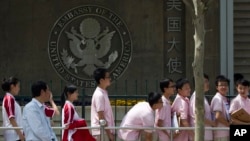Student Union
College Campuses Weigh Free Speech vs. Anti-Semitism
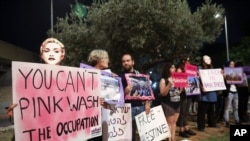
A recent presidential executive order declaring Judaism a nationality has further divided campus groups that either support or denounce Israel's occupation of the West Bank.
While the Trump administration says its Dec. 11 order targets anti-Semitism on campus, critics say it threatens free speech and the right to protest against the Israeli government. Anti-Semitism is hostility to or prejudice against Jews.
"If the government thinks it can sanction educational institutions for permitting students to say things like, 'I oppose Israel's West Bank settlements,' or 'Israel's treatment of Arabs is racist,' and say that the students who say those things are discriminating against Jews as a race, color, or national origin group, well, then the government is nuts," said Don Herzog, First Amendment expert and professor at the University of Michigan, Ann Arbor School of Law.
Herzog was referencing student and campus movements that oppose Israeli occupation of Palestinian territories and Israeli settlements, such as Students for Justice in Palestine (SJP) and Boycott, Divest, Sanction (BDS). SJP started at the University of California-Berkeley in 1993, and has more than 80 chapters in the U.S. and Canada. BDS was started on the West Bank in 2007 and has spread to college campuses in the U.S. and worldwide.
Those who support the executive order lauded U.S. President Donald Trump.
"We appreciate @realDonaldTrump's decision to give the @usedgov the authority to counter discrimination against Jewish students," the American Israel Public Affairs Committee (AIPAC), a pro-Israel lobbying group in the U.S., said in a Dec. 11 tweet.
The order will "recognize the importance of the problem" and gives "the Jewish people and the land of Israel large-scale recognition and acceptance, something President Trump should be commended for," said Syracuse University student Katie Berman.
Student Sari Leff, a senior at the University of Georgia, saw it differently.
"It may end up inciting more hatred and violence than we are already seeing. … The executive order feels incredibly inauthentic," Leff said. "The intention appears to be to criminalize criticism of Israel rather than protect the safety of American Jews on college campuses."
On college campuses, hate crimes increased from 862 to 1,070 between 2015 and 2016, a 25% increase, and continues to climb, according to the Chronicle of Higher Education, which analyzed FBI data of hate crimes on college campuses.
Increased awareness
Some people, including Trump, say the BDS movement has led to anti-Semitism because it has increased awareness about the conflict between the Israeli and Palestinian governments. On its website, the Anti-Defamation League, an international pro-Jewish and Israel nongovernmental organization, said, "The founding goals of the BDS movement and many of the strategies used by BDS campaigns are anti-Semitic."
An Indiana University fraternity was suspended Dec. 15 because of anti-Semitic and racist slurs. The Intrafraternity Council stated it is investigating the "disturbing increase of alleged anti-Semitic incidents," according to University of Indiana's student-run newspaper Indiana Daily Student.
Syracuse University suspended a fraternity's social activities Nov. 20 because of anti-Semitic events, including swastika graffiti.
BDS supporters push back on these depictions.
"The purpose of BDS is to fight for human rights, and is not about hostility or discrimination against the ethnic or national identity of the people of Israel," said Ramin Zareian, a junior at the University of Georgia and a campus BDS organizer.
"We want to use BDS and explain what it is, and talk about how it can be used to protest Israeli goods, lobbyists and right-wing supporters," said Jojo Darazim, vice president of Students for Justice in Palestine (SJP) at University of Georgia.
Cut contracts
Shelby Shoup, president of SJP at Florida State University, said the group is "pressuring Florida State University to cut contracts with companies that profit from Israeli occupation" and that they "fight for Palestinian dignity and freedom" with BDS.
The liberal nonprofit Jewish advocacy group J Street, however, said in a statement it believes "the prime driver of anti-Semitism in this country is the xenophobic, white nationalist far-right" and called the order "misguided," "harmful" and "cynical."
"If President Trump truly wanted to address the scourge of anti-Semitism he helped to create, he would accept responsibility for his role emboldening white nationalism, perpetuating anti-Semitic conspiracy theories, and repeating stereotypes," said Halie Soifer, executive director of the Jewish Democratic Council of America in the organization's press release, which also called the order "the height of hypocrisy."
The executive order could allow the U.S. Department of Education to deny funding to schools that receive federal funding if they are perceived as discriminating "on the basis of race, color, and national origin," as stated by Title VI of the Civil Rights Act of 1964. The U.S. State Department's example on their website for anti-Semitism says "manifestations might include the targeting of the state of Israel."
See all News Updates of the Day
- By VOA News
International students discuss US campus culture shock

International students at De Anza College in Cupertino, California, talked about culture shock in an article in La Voz News, the student newspaper.
"It felt like a major culture shock. Everything was so different, from academics to mannerism," said a student from Mexico.
Read the full story here.
These are the most expensive schools in the US
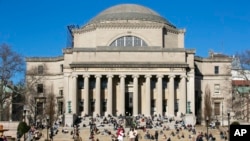
High tuition costs along with housing and food expenses can add up for students at U.S. colleges and universities.
MSNBC looked at the most expensive schools in the country, with one costing more than $500,000 for a bachelor’s degree. (June 2024)
Uzbekistan students admitted into top US universities

Students from Uzbekistan are among the international students admitted to top colleges and universities in recent years.
Gazata.uz profiled some of the Uzbekistan students attending Harvard, Brown, Princeton and other U.S. universities. (June 2024)
- By Stella Hsu
Reports of visa checks, deportations worry Chinese STEM students in US
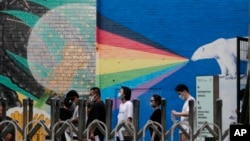
Geopolitical tensions and growing competition in tech between the United States and China appear to be spilling over into academia despite commitments from the world’s two biggest economies to boost people-to-people exchanges.
The United States remains the top choice for Chinese students seeking to study abroad with nearly 300,000 studying in American colleges and universities during the 2022-2023 school year. But reports of some cases that students and professors are facing extra scrutiny while passing through immigration and the deportation of others are raising concerns.
For Chen Xiaojin, a doctoral student studying semiconductor materials at a university in the Washington, D.C., metropolitan area, it has been six years since she returned to her hometown of Beijing.
At first, it was the COVID-19 pandemic that kept her from going home. But over the past two years, she has been deterred by accounts of Chinese students majoring in science and engineering being required to reapply for their visas upon returning to China.
She also says she is worried by reports over the past six months of Chinese students being deported, even at nearby Dulles Airport.
"My current research is relatively sensitive, and my boss [adviser] is getting funds from the U.S. Department of Defense, making it even more sensitive,” she told VOA. "I am afraid that I won't be able to return after I go back [to China]."
Chen says that if she did return to China, she would have to apply for a new visa.
In a report late last month, Bloomberg said it had found at least 20 Chinese students and scholars with valid visas who were deported at U.S. Customs since November and barred from reentry. The U.S. Customs and Border Protection Agency does not release relevant data.
Immigration attorney Dan Berger represented one Chinese student who was deported late last year. He tells VOA Mandarin that the student studied biological sciences at Yale University and was about to complete her doctorate.
She visited her family in China and got a new visa but was deported by customs at Dulles Airport and barred from reentering the country for five years. Berger said he did not see anything suspicious in the transcript of the conversation between the student and the customs officer.
"We have seen what seems like a pattern over the last six months of Chinese PhD students being turned around…. more than I've seen in quite a while," he said.
Matthew Brazil, a fellow at the Jamestown Foundation, said neither country seems willing to explain the situation. However, he believes that in most cases, the United States must have valid reasons for blocking visa holders from entering the country.
In some cases, the student’s background may not match what is written on the visa application. In other cases, customs agents may also find something that the State Department missed, and once they see it, they are responsible for taking action.
"I wish the Chinese side would be specific about their students who were refused entry,” he said. “The fact that both sides are mum on details and that the Chinese side is engaged with the usual angry rhetoric means that each has security concerns. And that says to me that there was good reason for the U.S. to stop these particular applicants."
Brazil also sees a connection between the entry denials and export control regulations issued by the United States in October 2022 that restrict China's ability to obtain advanced computing chips, develop and maintain supercomputers, and manufacture advanced semiconductors.
U.S. Customs and Border Protection is one of the law enforcement agencies authorized to investigate violations of export control regulations, he said.
"Beijing's intelligence agencies are known to focus attention on PRC [People's Republic of China] students and scientists headed abroad who study or work on dual-use technologies controlled under the Export Administration Act — compelling Chinese students and scientists to report on what they've learned when they return to China on holiday,” he said. “This has been true for decades."
Bill Drexel, a fellow for the Technology and National Security Program at the Center for a New American Security, said the U.S. government did find some cases where students tried to steal strategic technology for China.
"I think it would both not be surprising that they found some really questionable or incriminating evidence for some students,” he said. “It would also not be surprising if, in their hunt for really solid evidence, they also may have made some mistakes on other students.”
Drexel adds that “it’s just kind of an unfortunate fact of the time that we live in and the tactics that the CCP uses when it comes to these measures."
In a post on X in early May, U.S. ambassador to China Nicholas Burns tried to dispel concerns about visas and entry to the United States for students and scholars. In the post, he said "99.9% of Chinese students holding visas encounter no issues upon entering the United States.”
In an interview with The Wall Street Journal Monday, Burns said it is China that is making it impossible to promote people-to-people ties. Burns told the Journal that students attending events sponsored by the United States in China have been interrogated and intimidated.
He also said that since U.S. President Joe Biden and China’s leader Xi Jinping held their summit in San Francisco last year, China’s Ministry of State Security and other agencies had interfered with Chinese citizens’ participation at some 61 events.
At a regular briefing on Wednesday, Chinese Foreign Ministry spokesperson Mao Ning dismissed those accusations, saying that they did not “reflect reality" and that went against key understandings reached by both countries’ presidents in San Francisco.
“The United States, under the pretext of 'national security,' unjustifiably harasses, interrogates, and deports Chinese students in the U.S., causing them significant harm and creating a severe chilling effect,” Mao said. “The image of the United States in the minds of the Chinese people fundamentally depends on the actions of the United States itself.”
Drexel said he believes Burns’ comments about visas and students' willingness to study in the U.S. still ring true.
“On balance, it's still the case that American universities are overwhelmingly warm towards Chinese students and want them in large numbers," he said.
However, Berger, the immigration lawyer, is concerned about the chilling effect recent cases involving Chinese students could have.
"In general, we are being more careful about advising Chinese graduate students in STEM fields about traveling and letting them know that there is some small risk,” he said.
Even though the risk is small, it does seem to be real at the moment, he said.
Adrianna Zhang contributed to this report.
US federal judge blocks new regulation targeting for-profit colleges
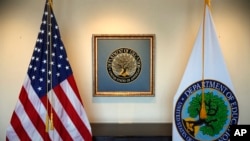
A federal judge in Texas has blocked a regulatory provision targeting for-profit colleges that was scheduled to take effect in July 2024.
Times Higher Education reports that the rule, which would affect student loans, was challenged by for-profit institutions. (June 2024)





